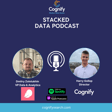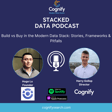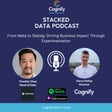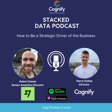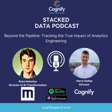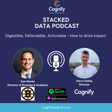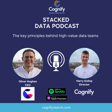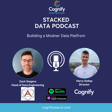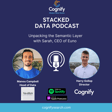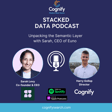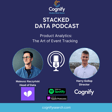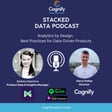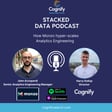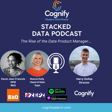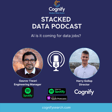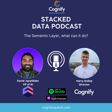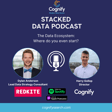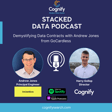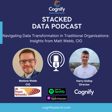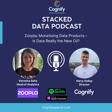
011 - Data, Culture and Impact - How McKinley drives data value at The Financial Times
𝐓𝐡𝐞 𝐡𝐚𝐫𝐝𝐞𝐬𝐭 𝐜𝐡𝐚𝐥𝐥𝐞𝐧𝐠𝐞 𝐟𝐚𝐜𝐢𝐧𝐠 𝐃𝐚𝐭𝐚 𝐓𝐞𝐚𝐦𝐬 𝐢𝐬 𝐭𝐡𝐞 𝐚𝐝𝐨𝐩𝐭𝐢𝐨𝐧 𝐨𝐟 𝐛𝐮𝐬𝐢𝐧𝐞𝐬𝐬-𝐰𝐢𝐝𝐞 𝐚𝐧𝐚𝐥𝐲𝐭𝐢𝐜𝐬 𝐢𝐦𝐩𝐚𝐜𝐭!
🚀 This week on the Stacked Data Podcast, I had the pleasure of sitting down with McKinley Muir Hyden, the Director of Data Value & Strategy at the Financial Times. We dive into the critical topics of data adoption and culture change in today's data-driven world.
🌐 McKinley brings a wealth of experience, and we kick off the discussion by exploring her journey into the realm of data and her current unique role at the FT. McKinley’s role revolves around bridging the chasm between data and the business. It's about ensuring alignment and, most importantly, measuring the impact of the data team's efforts as well as building the FT’s Data Academy.
𝚆̲𝚎̲ ̲𝚌̲𝚘̲𝚟̲𝚎̲𝚛̲:̲
🔍 How McKinley navigates the challenge of bridging the gap between data and business.
🤔 Reasons for lack of data adoption and the strategies employed to combat them.
🌟 McKinley's role is unique, and we delve into the origins of this specialized position and the objectives she aims to achieve.
📊 What exactly is a data culture and why is it crucial for organizations?
📏 How McKinley measures and evaluates data culture.
🚀 The challenges encountered in creating a robust data culture.
If you are looking to build and foster a data culture and inspire trust to ensure analytics impact this is not one to miss. McKinley shares her strategies and approaches as well as the common pit falls and blockers such as; Awareness, Discoverability, and Understanding.
Tune in and give us a FOLLOW, like or share!
🙌 Stay tuned for more inspiring conversations, and don't forget to subscribe! hashtag
hashtag#DataCulture hashtag#DataAdoption hashtag#Podcast hashtag#DataInnovation hashtag#StackedDataPodcast
